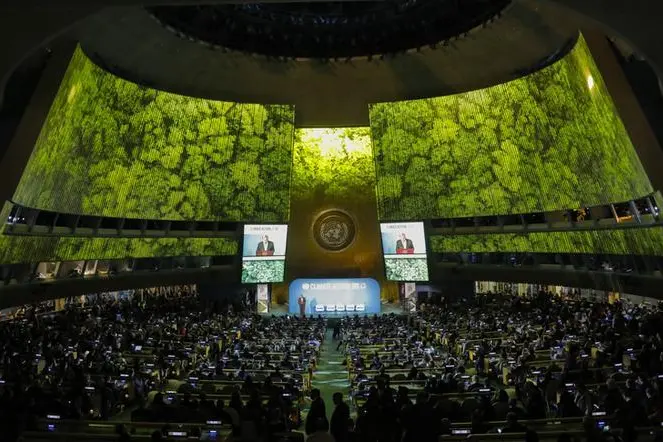PHOTO
Speaking on the second and final day of the UN’s Food Systems Summit 2021, attended by Arab News, world leaders, high-ranking politicians and other representatives of the international community outlined their plans to build resilience into existing food-delivery systems and to reimagine global food security in the era of COVID-19 and climate change.
Mariam bint Mohammed Almheiri, the UAE’s minister of state for food and water security, told delegates: “The magnitude of the task that faces the global community in meeting (the UN’s second Sustainable Development Goal of) zero hunger by 2030 is clearly huge. There is no time to talk, we have to act and act now.”
According to the UN, the Food Systems Summit was “a catalytic moment for public mobilization and actionable commitments by heads of state and government” to “empower all people to leverage the power of food systems to drive our recovery from the COVID-19 pandemic and get us back on track to achieve all 17 Sustainable Development Goals by 2030.”
In addition to specific aims such as eliminating hunger and poverty, the overarching objective of the SDGs is to ensure that development does not come at the expense of the environment.
To help achieve the goals, Almheiri said, “the United Arab Emirates has instituted a national dialogue centered around localizing food systems through the creation of special zones for modern farming and access to technology in the UAE.”
She added that the UAE’s food-security strategy is in line with the goals of the UN-wide initiative catalyzed by the summit, and outlined five strategic goals of the Emirati strategy: the strengthening of the country’s food-supply chains; the use of technology to create innovative solutions that can improve domestic food-supply resilience; reduction of food waste; improvements to food systems and nutrition; and the mitigation of food risks and crises.
These initiatives have already begun, Al-Mheiri said, and “will bear fruit within the next 10 years.” The UAE has also partnered with the US to fund global initiatives that will increase food security worldwide, she added.
Essam Khalaf, Bahrain’s minister of works, municipalities and urban planning, said his country has introduced an integrated and comprehensive plan to ensure the delivery of food to all of its population “in spite of the emergency conditions that we are living in due to the COVID-19 pandemic and the negative result it has had on food systems.”
The national plan will “assist small producers” and help to prepare the country to confront future emergencies, he added, and will operate in harmony with UN and international efforts relating to food systems.
Officials from Oman and Kuwait also affirmed their countries’ support for the objectives of the summit, in particular with regards to securing supply in local and international food systems.
Reem Al-Fulaij, general manager of Kuwait’s Public Authority for Food and Nutrition, said: “The challenges the world is facing and the challenges raised by COVID-19 leave no doubt that the present food systems have to be reformed and shaped to face challenges and provide for all populations in a sustainable way.”
Kuwait, she explained, is already making advances in efforts to secure global food systems. An organization dedicated to investing in food and agricultural security has been created, she added, and it also makes recommendations on ways in which the private sector can be mobilized to assist with food security.
Throughout the summit representatives of the participating nations, including the US, UK, Japan and Brazil, outlined the ways in which they will work to guarantee global food security. This is a growing concern, given the pandemic has disrupted worldwide supply chains and climate change is affecting the global weather systems farmers rely on.
In her closing remarks, UN Deputy Secretary-General Amina Mohammed said: “The results of this summit will inject energy to accelerate action on transforming food systems around the world that can better position our world to recover better from COVID-19 and achieve our shared vision of the 2030 Agenda.”
To do this, she added, the public and private sectors, governments and civil society must work together as part of a joint effort to reimagine how food systems operate.
“Together we can, and must, deliver on our shared agenda; for people, the planet and for prosperity,” she said.
Copyright: Arab News © 2021 All rights reserved. Provided by SyndiGate Media Inc. (Syndigate.info).





















